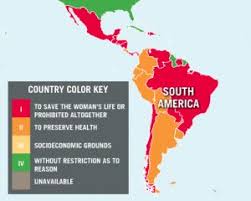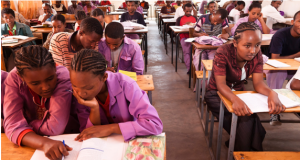Why Minority Victims of Sex Abuse Don’t Report
Nashara Turrentine
As a black woman, I grew up in a household that values and cherishes family and holds the family name to a high standard. Things that bring the family shame were never to be discussed with the public or with friends, and anything that happened amongst the family was to be resolved and never spoken on again. I place a strong emphasis on “never spoken on again,” and less emphasis on “resolved,” because many minority women, they are the ones shamed, and forced to move forward. This is especially true for women whose perpetrators are their older, male family members. Sometimes, the issue is simply brushed to the side, and their abusers are allowed to continue coming around. The reasoning behind this is not as simple as saying that families just don’t want to deal with the assaults. The importance of upholding the family name is incredibly prevalent amongst most minority families, and family shame, honor, and stigma are listed as some of the cultural reasons that there are barriers to women and children reporting their sexual abuse and abusers. The reputation of one’s family or that community is nine times out of ten placed at the forefront of the issue as opposed to bringing shame to the abuser, which seems like it would have the opposite effect in my opinion. I would much rather be slightly embarrassed that there is one single abuser in my family and be known for excommunicating them from the family than let people find out that not only did we enable the abuse, but we kept the abuser around after finding out they did anything to harm someone that I loved. I personally think your family name is soiled once people find out you are enabling something as disgusting as sexual assault or any kind of abuse. There are also many deeply ingrained stigmas and stereotypes pushed onto minority communities that hold plenty of women back from reporting their abuse. For example, black women are stereotyped as “fast,” and are apparently more likely to consent to sexual activity at a young age than others. First of all, you cannot consent to anything as a child. Secondly, I believe a lot of the black community is responsible for enabling and continuing on this idea that young black girls are “fast,” or “too grown.” Black mothers are very quick to tell their sons to “stay away from them fast little girls.” Why are you, as a black woman, helping perpetuate the idea that black women need less protection from predators and are more sexually advanced than their white peers? I can’t write this without bringing up the ever so famous “go cover-up, family is coming over.” When has it ever been okay to feel like your child needs to cover up their legs or midsection because their own male family is on the way to spend time with them? It’s not okay, but it is genuinely ingrained in the black community. If I move away from the black household and focus on the Middle Eastern or Asian household, especially the more traditional families, many women are deemed unworthy of marriage after sexual assault, as virginity is a virtue and sometimes, a requirement of marriage for these cultures.
Moving away from the subject household and into the issue of legal power being no help, many minorities are reluctant to report because they fear a lack of response, belief, or help. Many minority women, especially black women, already struggle with the criminal justice system as is. To report something as traumatizing as sexual assault or abuse takes a large dose of courage, and minorities historically already do not trust the legal system because truthfully, it was not built to protect or help them, and can sometimes work against them. 44% of white sexual abuse victims report their abuse while only 17% of black victims report the same abuse. Not only is there the lack of concern for black and minority victims, there’s also the issue of women of color being more likely to have their children taken away due to lack of protection if their child reports sexual abuse than white parents.
There is very little addressed as ways to create a solution to the problems we as minority women face when it comes to sexual abuse, and it seems to me like we have to work our way from the inside out. We need to address our internal issues and understand them. I won’t say we need to do that before the issues can be resolved on the outside but there are a lot of issues we have within our cultures that genuinely need to be addressed and fixed so that we do not perpetuate these issues any further.
Culture of Silence: Why Minority Victims of Sex Abuse Don’t Report



 ribbean ending in abortion increased between 1990–1994 and 2010–2014, from 23% to 32% Yet, they point out that more than 97% of women of reproductive age in Latin America and the Caribbean live in countries with restrictive abortion laws. Abortion is not permitted for any reason in six countries. Nine others allow it almost exclusively to save the woman’s life, with only some offering limited exceptions for rape (Brazil, Chile, Mexico and Panama) and grave fetal anomaly (Chile, Panama and almost half of the states of Mexico). Fewer than 3% of the region’s women live in countries where abortion is broadly legal—that is, permitted either without restriction as to reason or on socioeconomic grounds. Therefore, women, especially young women who experience unplanned pregnancies are likely to resort to illegal and often unsafe abortions that will have major health consequences for them.
ribbean ending in abortion increased between 1990–1994 and 2010–2014, from 23% to 32% Yet, they point out that more than 97% of women of reproductive age in Latin America and the Caribbean live in countries with restrictive abortion laws. Abortion is not permitted for any reason in six countries. Nine others allow it almost exclusively to save the woman’s life, with only some offering limited exceptions for rape (Brazil, Chile, Mexico and Panama) and grave fetal anomaly (Chile, Panama and almost half of the states of Mexico). Fewer than 3% of the region’s women live in countries where abortion is broadly legal—that is, permitted either without restriction as to reason or on socioeconomic grounds. Therefore, women, especially young women who experience unplanned pregnancies are likely to resort to illegal and often unsafe abortions that will have major health consequences for them.
